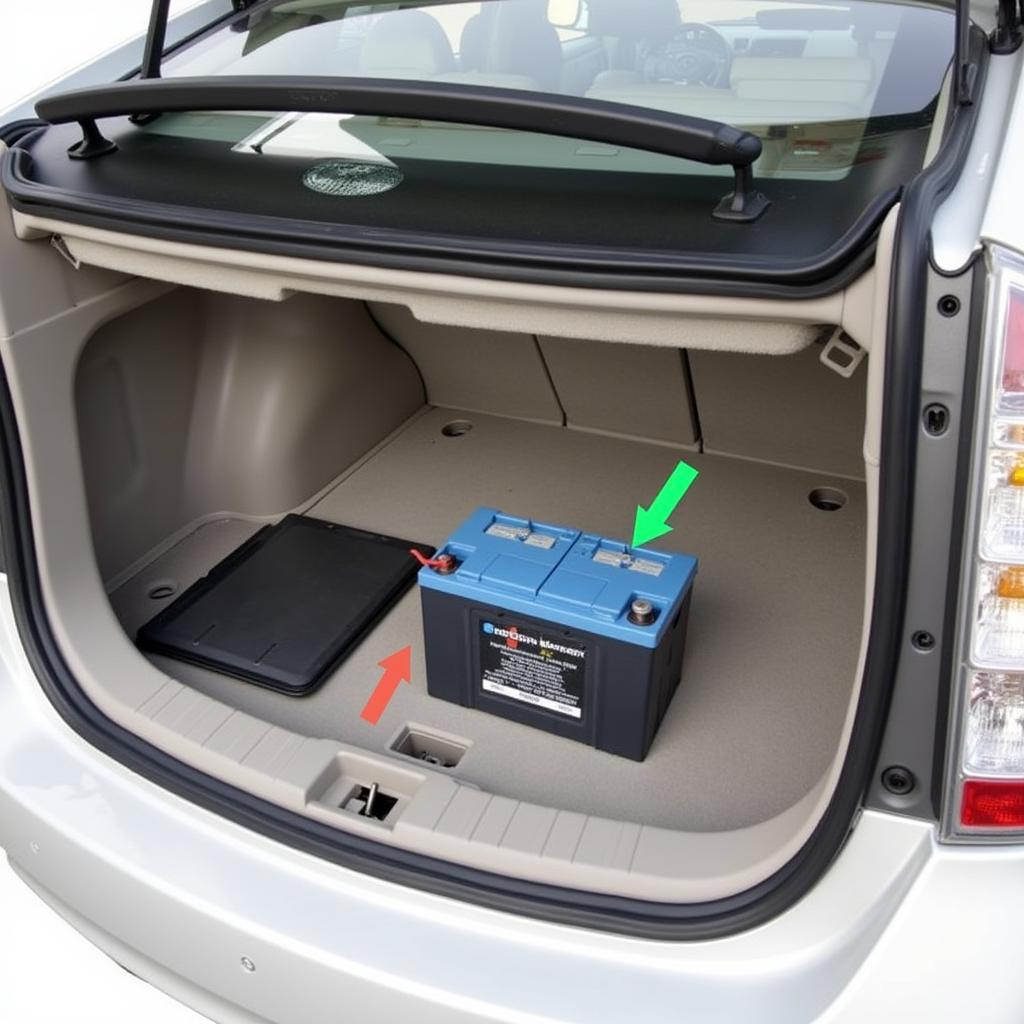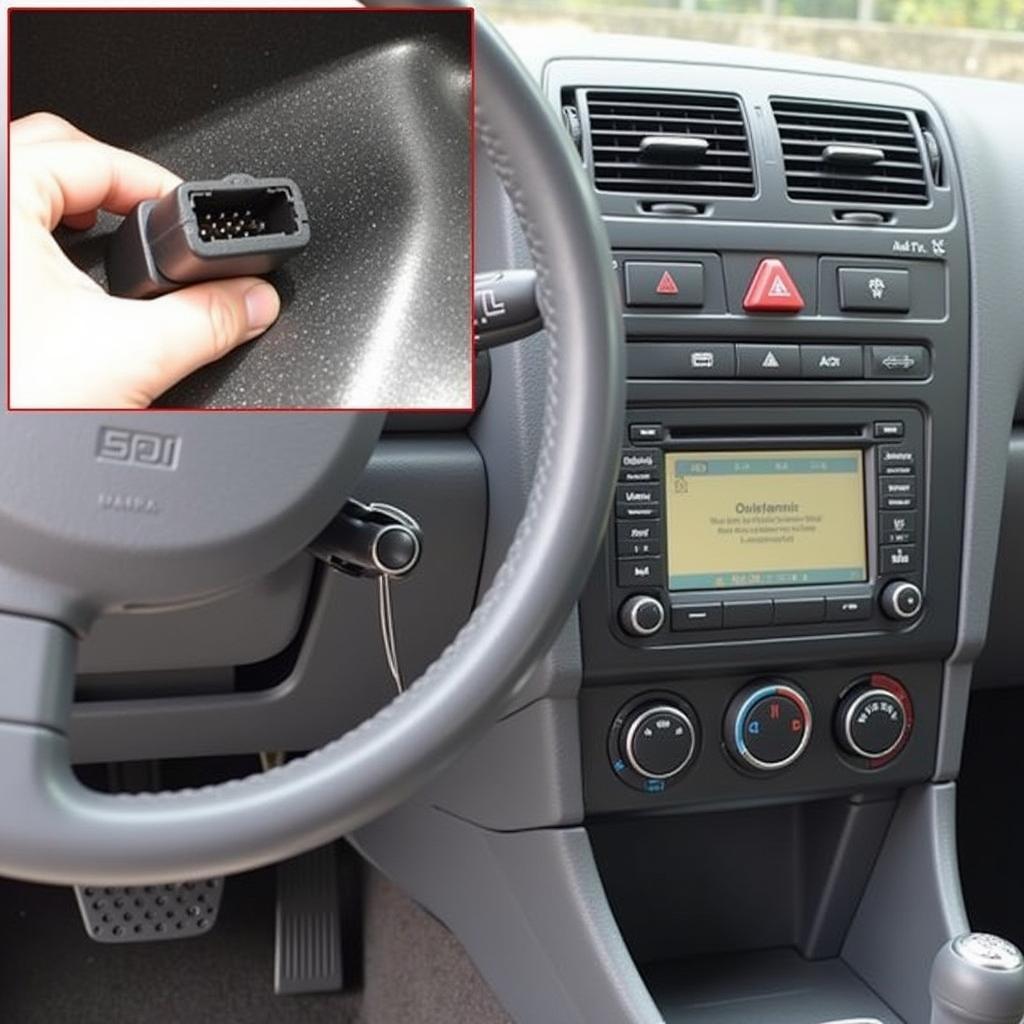The brake warning light on your Jeep Cherokee dashboard is a crucial safety feature, illuminating when the vehicle’s computer detects an issue within the braking system. Ignoring this warning light could lead to reduced braking performance and potentially dangerous situations. This comprehensive guide will explore the common causes of a Jeep Cherokee brake warning light and provide potential solutions to get you back on the road safely.
Common Causes of a Jeep Cherokee Brake Warning Light
Several factors can trigger the brake warning light on your Jeep Cherokee. Here are some of the most prevalent causes:
- Low Brake Fluid Level: This is the most common culprit. Brake fluid is essential for transmitting force from the brake pedal to the wheels, and a leak or low fluid level can significantly compromise braking efficiency.
- Worn Brake Pads: Brake pads naturally wear down over time. When they reach a certain level of wear, a sensor within the brake pad assembly will trigger the warning light, signaling the need for replacement.
- Faulty Brake Caliper: The brake caliper houses the brake pads and pistons, applying pressure to the rotors to slow or stop the vehicle. A sticking or malfunctioning caliper can cause uneven braking, dragging, and illuminate the warning light.
- ABS System Malfunction: The Anti-lock Braking System (ABS) prevents wheel lockup during hard braking, ensuring steering control. A fault within the ABS system, such as a faulty wheel speed sensor, can trigger the brake warning light.
- Parking Brake Engaged: Sometimes, the simplest explanation is the most likely. If the parking brake is not fully disengaged, it can trigger the warning light.
Diagnosing the Problem
Identifying the exact cause of the brake warning light requires some investigation. Here’s a step-by-step guide:
- Check the Parking Brake: Ensure the parking brake is fully released. If the light remains on, proceed to the next step.
- Inspect Brake Fluid Level: Locate the brake fluid reservoir under the hood. Check the fluid level. If it’s low, adding brake fluid might temporarily solve the issue, but it’s crucial to identify and address the underlying cause of the low fluid level, such as a leak.
- Inspect Brake Pads: Visually examine the brake pads through the wheel spokes. If they appear thin or worn down, it’s time for a replacement.
- Listen for Unusual Noises: Pay attention to any grinding, squealing, or scraping sounds during braking, which could indicate worn brake pads or a problem with the calipers.
- Feel for Braking Issues: Notice any vibrations, pulling to one side, or a spongy brake pedal feel, as these could signify issues with the calipers, rotors, or ABS system.
When to Seek Professional Help
If you’re uncomfortable performing these checks or suspect a more complex issue, it’s always best to consult a qualified mechanic specializing in Jeep vehicles. They have the expertise and equipment to diagnose and repair brake problems accurately.
2007 Jeep Cherokee Brake Warning Light: A Case Study
A common scenario we encounter is a 2007 Jeep Cherokee brake warning light illuminating intermittently. This could be due to a failing wheel speed sensor, a common issue in this model year. A faulty sensor can disrupt the ABS system, triggering the warning light. Our expert technicians can quickly diagnose this issue using advanced diagnostic tools and replace the faulty sensor, restoring your Jeep’s braking system to optimal performance.
Preventing Future Brake Problems
Regular maintenance is key to preventing brake problems:
- Regular Brake Inspections: Have your brakes inspected at least once a year or every 12,000 miles, or as recommended in your Jeep Cherokee’s owner’s manual.
- Timely Brake Pad Replacement: Don’t wait for the warning light to come on. Replace worn brake pads promptly to prevent damage to the rotors and other brake components.
- Brake Fluid Flush: Flush and replace your brake fluid every 2 years or 24,000 miles to prevent corrosion and maintain optimal braking performance.
Conclusion
A glowing brake warning light on your Jeep Cherokee is a serious matter that should never be ignored. By understanding the common causes, performing basic checks, and seeking professional help when necessary, you can address brake problems promptly and ensure your safety on the road. Remember, preventative maintenance and timely repairs are essential investments in your safety and the longevity of your Jeep Cherokee.
FAQs
Q: Can I drive my Jeep Cherokee with the brake warning light on?
A: While you might be able to drive a short distance, it’s strongly advised against it. Driving with a brake warning light can be dangerous and lead to further damage.
Q: How much does it cost to fix a Jeep Cherokee brake warning light?
A: The cost varies depending on the underlying cause. Simple fixes like low brake fluid are inexpensive, while replacing major components like calipers or the ABS module can be more costly.
Q: How often should I replace my Jeep Cherokee’s brake pads?
A: Brake pad lifespan varies depending on driving style and conditions. Generally, expect to replace them every 30,000 to 70,000 miles.
Q: 2000 Jeep Cherokee Brake Warning Light staying on after replacing the brake pads?
A: If the light persists after replacing brake pads, there may be a faulty brake pad sensor, an issue with the brake fluid level, or a more complex electrical problem.
Q: Can a bad battery cause the brake warning light to come on?
A: While unlikely, a severely discharged or failing battery can sometimes cause various warning lights, including the brake warning light, to illuminate.


